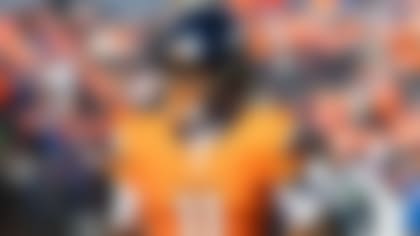IRVING, Texas (AP) -- Days before officially becoming a member of the Pro Football Hall of Fame, Michael Irvin has a confession to make.
"I'm afraid," Irvin said.
The hesitation has nothing to do with the speech he'll give during Saturday's induction ceremony. Anyone who has followed football the last 20 years knows Irvin is anything but shy.
What worries the former Dallas Cowboys star receiver is the burden that comes with being part of this fraternity. The thought of seeing "Hall of Fame receiver Michael Irvin got in trouble again" crawl across the bottom of a TV screen intimidates him more than any defense ever did.
"Absolutely!" Irvin said. "Being a Hall of Famer deserves the best that I have. I respect it, and I believe it deserves that. I think that fear will keep me tied down. It's a reality, something I think about. That's just being honest."
Playing alongside Troy Aikman and Emmitt Smith, Irvin set nearly every meaningful receiving record in Cowboys history and was widely acknowledged as the heart and soul of teams that won three Super Bowls in four years.
Yet he, and his teams, might've been better if not for Irvin's problems with drugs and life in the fast lane.
The downfall began in March 1996, a few weeks after the third Super Bowl win, when police crashed Irvin's 30th birthday party and found him, marijuana, cocaine and strippers in a hotel room. He pleaded no contest to felony cocaine possession and was put on probation for four years.
He's turned up on the police blotter many times since, as recently as November 2005. His career was never the same following the birthday bust. The Cowboys haven't been either.
Dallas made the playoffs in 1996 even though Irvin was suspended the first five games. The Cowboys won a wild-card game but have yet to win another postseason game.
"Most of the guys who come from where I come from and have the issues I have off the field, you have this sense that, 'I can do it, I can fix it, I can get better,"' said Irvin, the third-youngest of 17 siblings from Fort Lauderdale, Fla. "It was a great attitude to have on the football field, but the reality is that in life I needed help. My greatest asset was my greatest liability. ...
"There were times after (the '96 arrest) that I said, 'We'll win a few more Super Bowls, I'll fix it.' I couldn't. I didn't. I've always felt I was in debt to Cowboys fans for robbing them of that offseason of bragging and enjoying and celebrating after we won Super Bowl XXX."
Irvin was forced into retirement by a spine injury suffered in the fourth game of the 1999 season.
As he was taken away in an ambulance, Philadelphia fans cheered. It was testament to the emotions Irvin riled up - for pushing off, for making his exaggerated first-down gesture and just plain being Michael Irvin.
The Playmaker was a love-him-or-hate-him kind of guy, except in the Dallas locker room. His charm and wit helped him connect with everyone, while his work ethic and will to win enabled him to hold others accountable, regardless of his personal problems.
"Michael was unbelievable," former teammate Jay Novacek said. "We lockered next to each other, two people from opposite sides of the country, opposite ways of thinking, opposite color - the whole thing. And he ended up probably being the guy I looked up to as much as anybody with his work ethic in practice, the way he handled himself mentally in preparing for a game. I don't think there was anybody as good at doing that as he was. He helped me out a bunch and didn't even know it."
Irvin became a household name as the most flamboyant member of one of college football's most flamboyant teams, the 1987 national champion Miami Hurricanes.
He arrived in Dallas in '88, the final first-round pick by Tom Landry and Tex Schramm. His second season was marked by the arrival of his college coach, Jimmy Johnson, Aikman, an injury that cost him 10 games and a 1-15 record. But things were changing quickly.
Two years later, Irvin led the league in yards receiving, posting the first of seven 1,000-yard seasons and starting a run of five straight Pro Bowls. The Cowboys won Super Bowls following the '92, '93 and '95 seasons, reaching the NFC title game in '94.
His best year was 1995, when he caught 111 passes for 1,603 yards and 10 touchdowns, all career highs, and set an NFL record with 11 100-yard games.
Chosen to the NFL's all-decade team for the 1990s, Irvin was among the top 10 on the career lists for receptions (750) and yards receiving (11,904) when he retired. He wasn't too high on the touchdown list, having been stopped just shy so many times that his buddy Smith wound up setting all sorts of rushing TD records - or so the joke goes.
A lack of speed was more to blame. His physical gifts were size (6-foot-2, 207 pounds) and strength. And he knew how to use them, forcing the league to create "The Michael Irvin rule" limiting contact between receivers and defenders.
"I never coached a player who had as much passion for the game as Michael Irvin," Johnson said. "He also was the guy who I knew at crunch time I could depend on to come through with a key play. He never shied away from making the tough catch."
Despite all his accolades, Irvin couldn't get into the Hall on his first try. Or his second.
"Mistakes will cost you. That's the reality," Irvin said. "I like that it worked out the way it worked out. That's a lot easier to say now, but I really do believe that."
Aikman and Cowboys owner Jerry Jones have been Irvin's most loyal supporters. Aikman was enshrined in Canton last year and will return for Irvin's big day. Jones will be Irvin's presenter.
"Michael showed us all how to get on a knee and get up and come back and overcome that," Jones said. "It just seemed like it kind of fits his pattern to have gotten knocked down twice (by voters) and then step up there and do it."
The yellow Hall of Fame jacket won't be any more garish than many of the suits in Irvin's closet. Then there's the matter of his bust.
The sculptor initially made it with an intense game face, but Irvin requested something "a little more jovial." It wasn't so simple.
"When I smile, I show teeth and on the bust the teeth are brown, so we didn't go all the way. It's more of a smirk," Irvin said. "I hope people aren't saying, 'He's smirking that he got in."'



